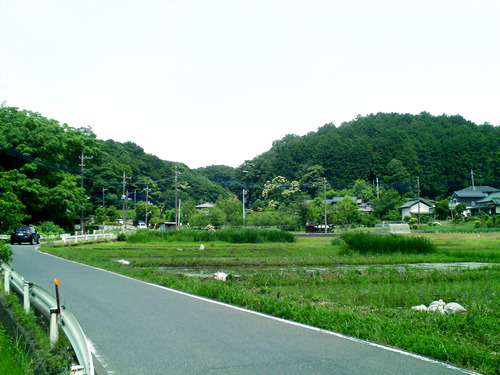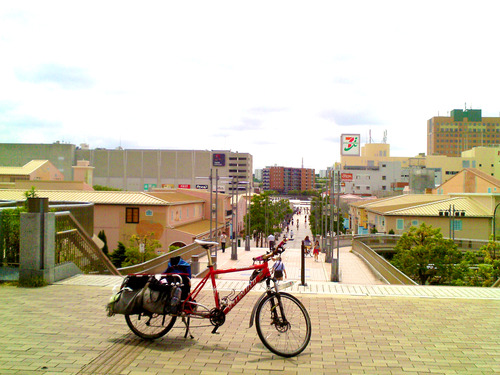ELSI Blog
102 My kind of Tokyo
At home
I'm a country boy. I grew up in Montana, which is about the same size of Japan, but has just less than 0.8% of the population. Perhaps this was one of the reasons my Montana family was a bit surprised when I announced that I applied for a faculty position in Tokyo, and more surprised when I accepted the offer of a job there. A Montanan in Tokyo? My grandmother simply asked "why?"
Close your eyes, and think of Tokyo. What do you see? It is the largest metropolitan area on the planet: maybe you see in your mind Shinjuku, or Shibuya. Big. Busy. Lights. And so I thought too. I was intending to move to Tokyo to try a living experiment in a small island nation in a city that someone once described as "the closest thing on Earth to a moon-base". It's hard to see in your mind though how quiet it is, how you probably are not hearing anyone yell, or any horns honking. (Close your eyes and think of New York City. You can probably hear the horns! Beep beep!)
I like to ride my bike. I ride my bike every day, to work, or for fun; for both. And so when I began looking for a place to stay in Tokyo, I did what many of us do, I looked on airbnb! And I chose the greenest area I could find on google Earth (thank you google and NASA!) within cycling distance to my university. Satellite photos do not lie. I had ended up living in a house (not everyone in Tokyo lives in a small apartment!) surrounded by small farms and rice paddies. (I have since learned that this area's name, "Shimooyamadamachi" means something like "small rice field at the bottom of the hill". Which describes the area quite nicely.
I am a local-vore. I love to eat what is in season and produced nearby. It's the way I've always lived (or tried!). It's what my mom taught me - fresh is best! We always had the best tomatoes and potatoes from our small garden when I was growing up. But in Japan, I thought I would succumb to the island economy - and pay famously exorbitant prices for basic commodities like fruits and vegetables. I'm happy to report though that I am able to buy local produce in Tokyo at least as easily as in California where I lived before Tokyo - but different from the California situation is that I buy all my produce now from small farm stands and usually the veggies are sold by wonderfully cute and kind Japanese grandmothers (Obachan). I eat what they grow and what is in season. I give the Obachan lots of business, and they teach me Japanese. Is it Tokyo? Of course it is! My Montana family is relieved. Me too.

The road to Tokyo Metropolitan University from my house in O-yamada-machi.

And outside the university, with my bike.
At the university
Anyone coming to Japan to work in academia might enjoy and benefit from reading "A Practical Guide to Working as a Scientist in Japan" by Robert W. Ridge. You can find it online. It's a bit old, but is fun reading and still accurate in many ways. I was hired by the Tokyo Metropolitan University as an Associate Professor. In the Japanese system, (and American too!) I seem a bit young for this and would probably be expected to begin at the Assistant level. Apparently though, my university thought I could pull it off (I'm trying!), and perhaps most importantly for my position, associate professors can teach more than assistant professors. With my English tongue, I was just what the university needed for its new (and exciting) English language curriculum. So I teach a lot, and began my job after some slight rule bending of some type to hire me at my young age. I'm the first foreigner hired in the Department, which is interesting, exciting, and sometimes a bit of other things.
A big surprise for me was when I learned that the funding for my position as well as that of another professor, and the implementation of a full biology curriculum in English is only about 2 years old! It is incredible to me that this much can happen at a university so quickly; some wheels can apparently spin very quickly! In Japan, this type of flexibility is all balanced by frequent occurrences of extreme conservatism. Some things simply cannot change here. I'm still trying to get a credit card and the bank at first simply told me NO since I am a foreigner. A rule is a rule and that is that, but somehow other things can change, and fast!
Perhaps this duality of fast change sometimes and conservatism at other times helps explain the co-existence of serene tatami spaces just footsteps away from that famous moon base atmosphere of downtown Tokyo. To the visitor, Japan seems safe and stable, and certainly the Japanese are among the most accommodating people I have ever encountered. But the co-occurrence of change and stability here is another way of saying that it is a far from equilibrium system; it is stability accomplished by change, and in the same way that earthquakes often rattle the county, people and policies do too. It's part of what makes Japan such a very interesting place to live. Perhaps this apparent balance of stability and dynamism at the level of a society is somehow closer to the state of our own biological cells and ecosystems; massive changes and fluxes all accomplished in the name of a temporary order. It is fun to see how energy can organize material indifferent ways and at different scales - Tokyo is teaching me some new ways for this!
In the laboratory
I share laboratory space with 2 other professors. The laboratory is established by the department as an area of research, and it is inhabited by us professors and students too. We comprise the "Environmental Microbiology" laboratory. It's awesome since we share all the equipment and there is a real diversity of expertise. The students get advice from multiple perspectives, and we all work together yet retain our independence.
The laboratory is quite crowded, and space is limited as you might imagine in Tokyo. I'm now an associate professor, but I have a desk that is similar in size to what I did when I was a PhD student, and it is in the lab! A basic principal that seems to permeate the laboratory here is the concept of "mottainai". I'm sure I'm going to get this wrong, but it is something about saving things and equipment in case it is one day useful. It's true - it's good to hold on to things that might be useful later. But in English we also have the phrase pack rat, and that is somehow related to mottainai as well. So there is lots of old equipment that I often think should be recycled or worse; but again and again, some day does seem to come when that old glassware, or peristaltic pump, is just what you need for your latest experimental idea. Again, life in Japan and work too teaches a foreigner new ways of organizing material.
The ride home
After I've had enough in the lab, I ride my bike up and over a hill, descending into O-yamada where I live. The rice fields have recently been flooded and the plants are shooting upwards, and I hear the chorus of what must be thousands of frogs. It's perhaps the quietest place I've lived - even being from Montana! And certainly compared to Pasadena where I was before.
Is it Tokyo? Yes, It's my kind of Tokyo. Here's a place that by earthquakes or orthogonal histories, shakes you up a little bit every day. A friend told me before I moved that "Japan will change you". She was right - it is part of the joy of the world today that we can challenge each other peacefully and with significant gain by inviting with, and accepting gracious hospitality. Like this, somewhere in the middle of the distance, we can better think the things that were un-thought before.











